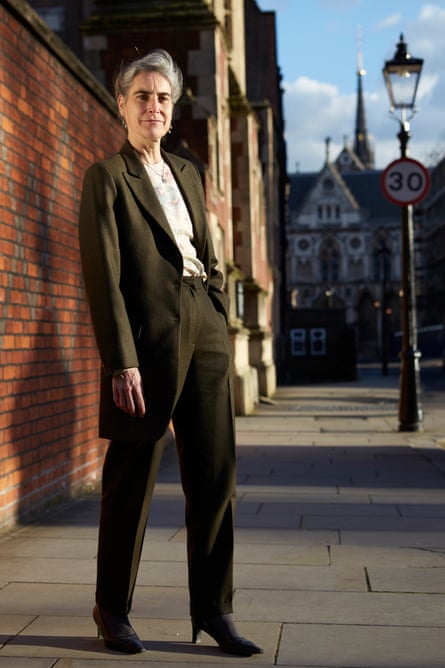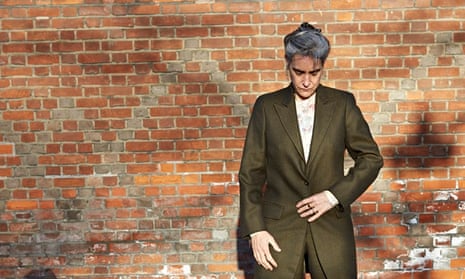The central idea of Sarah Chayes’s radical new book, Thieves of State, is that corruption – be it bribes, vote-rigging, embezzlement, nepotism or any of its many forms – unsettles local populations and directly threatens global security. The US author saw this happen in Afghanistan – where she lived for almost a decade after 9/11 – and believes the same patterns operated during the Arab spring, in the rise of Boko Haram in Nigeria and, more recently, in Ukraine.
How did you end up in Afghanistan?
I was a radio reporter covering the fall of the Taliban. For some time I’d started to feel a bit irresponsible that as journalists we’re making our living off of other people’s drama, and yet we’re not responsible for how it turns out. I’d been feeling for a while it was time to get stuck in.
You worked for an NGO run by president Hamid Karzai’s older brother Qayum, and then you set up a co-operative that made soap. But – unlike most westerners – you lived with Afghans.
Totally. I lived with regular people, I had no barbed wire, no sandbags. We kept guns, but no more than any Afghan would keep guns in their house. Every house in Kandahar has guns in it, so when it started getting bad, we decided to acquire a couple of Kalashnikovs. That was mostly because I felt I couldn’t ask particularly the [Afghan] men to go down without taking someone with them. It’s not that I thought we could actually protect ourselves, but at least you have the honour of making it cost something to the other side.
Is it true that you slept with a Kalashnikov by your bed?
For a couple of years.
You say that with a dismissive wave of the hand...
A friend of my mother’s who worked in peace and conflict resolution asked me, “What would you do if the Taliban attacked your house?” Which they perfectly well could: everyone in town knew where I was and we just had a wall. And I said, “Well, I’d get on the roof and start shooting.” She was horrified by this and I was totally shocked at her shock. My question really was: where the hell do you think I am?
Was the work you were doing worth risking your life for?
In the US today, almost as a salutation, people say, “Be safe.” And I started thinking, “Should this be my aspiration in life – to be safe?” To me, and I explicitly felt this until 2010, the objective of a well-lived life is where you have a mission or an objective you think is valuable enough that it’s worth taking risks for.

Until 2010? By which point, you’d become a special adviser to the chairman of the joint chiefs of staff, the highest-ranking officer in the US military.
I remember the sentence audibly going through my mind: “I’m not willing to die for this any more.” I did think it was worth dying for until I really saw the US was unwilling to address the underlying drivers of the conflict. I was caught within a policy that was not going to achieve the objectives. So I said, “Oh! Well, how can I ask a soldier to die for it?” At which point, logically, I have to be in favour of withdrawal.
Was there an activity you could do in Afghanistan that felt like a total break from an intense situation?
Not really much. I used to run very seriously, but it was very hard to do it – I’d have to drive out to the desert with several of my guys, and run in full dress. In a strange way, making soap was a break, because it was very tactile, and each bar was meant to be a kind of sculpture, to look like a piece of river-polished marble. I spent very little time with other expats. I never went to the weekly drinking bashes, and didn’t integrate their social circles. I wasn’t wild about how they conducted themselves, and what they represented to Afghans.
What was the last great book you read? Or film that you saw?
Radical Hope: Ethics in the Face of Cultural Devastation by Jonathan Lear; [the journalist] Sebastian Junger recommended it. It’s about the last chief of the Crow Indians at the time of confinement to reservations. An utterly transformational book. I’m not much of a moviegoer – don’t even have a TV.
Sebastian Junger was a childhood friend. So you have kept in touch, then?
Very much so. He visited me in Kandahar – it was a wild time, because it just happened to be an evening when a bunch of people came to visit: a friend who ran an NGO, a district police chief and a few of his men. So Sebastian got a view of the Afghan reality that he was neither exposed to, nor really interested in for the purposes of his own work, which was focused on US men at war. We continue to share our thinking and inspire each other.
Your father was involved as a lawyer with the Kennedy administration. Did that fuel your interest in global politics?
Both of my parents have been deeply involved in public life. My mother was under-secretary of the air force in Jimmy Carter’s government. All they asked of their children was to do something constructive with their lives, but it was clear that public service and international affairs were important to them. I think I also derive my strong attachment to issues of justice from my father, who was a law professor for most of his life. But I think I may even have focused on the question of justice more intensively than him.
Is it true you drew up a list of Afghan officials to be investigated for corruption and many of them were on the payroll of the CIA?
That was after 2010, but I had known it since 2003, because I was close to the Karzais and I’d watch CIA guys come to visit [the president’s half-brother] Ahmed Wali Karzai and hand him foil-wrapped packages. And it wasn’t drugs!
What’s an example of corruption outside Afghanistan and the impact it has?
In Nigeria, according to the former governor of their central bank, $20bn (£13bn) went missing from the oil revenues in an 18-month period. So that’s $20bn not being spent on infrastructure, healthcare, education. But when the UK spends development pounds in that environment, not only are they capturing your development money but you’re also making up for a deliberate non-investment on the part of that host government. And similarly, I wonder how much dirty Nigerian money is sloshing around London. I’m not necessarily saying it’s up to us to solve corruption in all of these countries, but please let’s at least take care not to make it easier.
You’ve been critical of UK and US foreign policy – how does that go down?
I just came from a meeting at the Department for International Development, and it’s quite challenging to tell people that very often their funding is being captured as a revenue stream by a kleptocratic elite. Far from benefiting the population, they are reinforcing an abusive governing system.
Isn’t corruption simply inevitable and eternal?
Corruption, of course, has existed as long as government has existed. But in all the countries I researched I asked, “Has there been a moment when things really went off the rails?” Every one had a year – I’m talking Syria, Bahrain, Afghanistan, countries involved in the Arab spring, Nigeria – and the year was basically right around 2000, the late 90s. I think something very significant happened with the collapse of communism and the exaltation of greed – partly by Reagan and Thatcher – and massive deregulation. I think that has had a real impact on the ethos of public service in a lot of countries.
The countries you focus on are less democratic than the UK and the US. Should we be concerned about corruption at home?
The economic crisis of 2008 is linked to this type of issue. Deregulation of the financial sector allowed and legalised a whole lot of activity that shouldn’t have been legal. Then money in the form of taxes was massively transferred into the pockets of criminals in the banking sector. Now that’s very similar to what happened in Tunisia under Ben Ali. The Tunisians rose up against it – we aren’t. This issue occasionally manifests itself in terms of revolt, but not as much as I think it ought to, given the magnitude of the problem. In the UK and the US, we’re in danger of letting our republics slip out of our hands without even noticing it and the results could be really devastating over time.
Thieves of State: Why Corruption Threatens Global Security is published by WW Norton

Comments (…)
Sign in or create your Guardian account to join the discussion